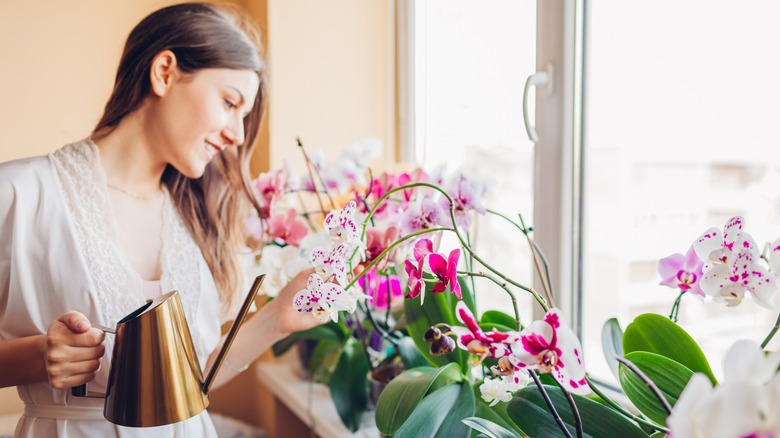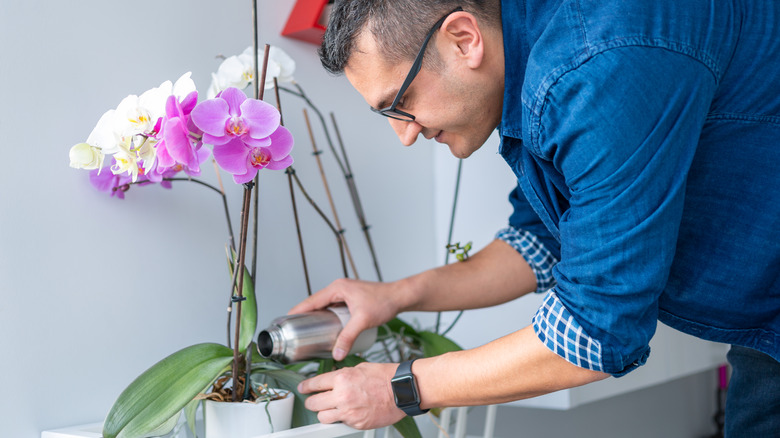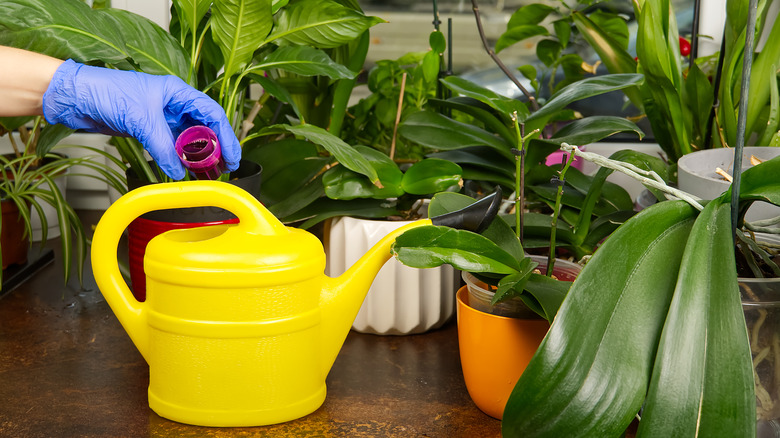These Fertilizing Tips Will Help Your Orchids Thrive
Orchids are finicky plants that need fertilizer to thrive but are particular about when and how much you give them. (We have a list, if you're looking for orchids that make the easiest houseplants.) They need the macro and micronutrients that fertilizer provides. Without it, they wouldn't have enough energy to produce healthy roots and foliage. They do best with a balanced 20-20-20 formula, but this can change depending on their needs.
There are signs to look out for to decipher what your orchid is lacking or overwhelmed by. If they're stagnant during the spring and summer, when they're supposed to be growing, they require more fertilizer. The foliage may wilt or turn yellow and brown. The plant can also appear weak and limp. Meanwhile, their foliage will burn if your orchid gets too much fertilizer. The leaves will turn brown or yellow at the tips, the roots will die, and flowers won't be able to bloom.
You should also look out for a crusty layer of salt developing on the soil because this is a sign of a build-up of minerals in the potting mix from too much fertilizer. Your orchids will be ready for success once you know when to feed them and how much to give them.
Use a balanced fertilizer
Orchids need fertilizer to stay healthy and grow to their full potential. It adds micro and macronutrients to the soil so your plants can absorb them and create energy. Once they build up enough energy, they can use it to grow larger and stronger. You'll notice the difference in their foliage, but even their root system benefits from fertilizer. The macronutrients in fertilizer are what your plant needs in larger doses. They are nitrogen, phosphorus, and potassium. While the micronutrients are only trace amounts of iron, manganese, boron, and many more ingredients.
When looking at what fertilizer to use, pay attention to the three numbers it lists on the label. A safe option to go for is a balanced 20-20-20 formula that will have equal amounts of macronutrients in it. However, the pot that your orchid is in will affect its needs. If you have them mounted on wood, they will need more nitrogen. Then you should give them a 9-3-6 fertilizer.
Whether or not you're trying to encourage more flowers to grow will also change the type of fertilizer. For more blooms, choose a 3-12-6 formula that has more phosphorous. Although, you'll want to return to the balanced option once you see flower spikes growing.
Dilute the fertilizer to use every week
When you fertilize your orchid is just as important as what you feed them. They're prone to fertilizer burn, so you'll need to dilute the formula even more than you would with other plants. Orchids grow better when you stretch out their nutrients into small amounts that they get more frequently. The key is to follow the four-week rule.
For the first four weeks of the month, dilute the fertilizer to a quarter of the recommended potency. You'll give your orchids clean water first and then follow it with the fertilizer solution. That way, you lower the risk of burning their roots and foliage. Then after four weeks have passed, you'll water them and skip feeding them. Doing this removes any built-up salt from the soil.
Depending on the time of year, your orchid may not need any fertilizer. You only want to feed them when they're growing. This is usually from spring to summer. When it gets cold in the fall and winter, your plants go into dormancy. They don't need any fertilizer because they're conserving their energy until it gets warm again. You can feed your orchids once a month during this time. Although, it's usually better to refrain. Another time to stop fertilizing is if your orchids are flowering. The nutrients in a balanced formula are meant to support foliage growth, which would distract your plant from producing large blooms.


